(8 pm. – promoted by ek hornbeck)
Those of you that read this regular series know that I am from Hackett, Arkansas, just a mile or so from the Oklahoma border, and just about 10 miles south of the Arkansas River. It was a rural sort of place that did not particularly appreciate education, and just zoom onto my previous posts to understand a bit about it.
Since we have had a really cold snap here in the Bluegrass, I began reflecting on what it like in the winter when I was growing up in Hackett. When I was a kid it was colder in the winter in Arkansas for the most part than it was when I was older. A least, that is how I remember it being. Kids tend, or at least tended at the time before video games and computers, to get outside even during cold weather, but I think that it was colder back then, and I have some memories of why I think that.
For one thing, it snowed and sleeted more then than it did later. Now where I grew up one or two snows deep enough to build snow men is about typical, but as I recall there would be three or four snows when I was little. They seemed to last longer, but days seem longer to a child than to and adult.
In any event, I vividly recall being able to walk across the pond behind my house in the winter with no cracking of the ice at all. This was sort of a double edged sword, because I had to go chop through the ice on the pond so that the cattle could drink at least twice a day, more often when it was really cold. After the first or second time I learnt to remove the ice from the hold that I had made so it did not just freeze back again. I am guessing that I was about nine or ten then.
I never liked chopping ice, because I always seemed to get wet even though I tried to be careful. Getting the chunks that I had chopped out of the hole was the difficult bit as far as that goes. I tried the shovel, and the ice would usually just fall off of it before I could get it away. I tried several different tools to remove it, and finally hit on using either a hoe or a garden rake to catch the edge of the ice, then flip it over onto the frozen surface of the pond, then give it a push and thus scoot it away. That worked pretty well, but sometimes a block would flop back into the hold and splash me with frigid water. Fortunately, the house was just a minute or two away.
We did not get enough freezing weather for it to justify things like ice skates, because long cold snaps were spotty, not happening every year often enough to freeze the ice thick enough for safe skating. My dad was a good skater, but that was he spent his high school years in Roundup, Montana where it certainly gets cold enough long enough for lots of skating.
We were able to so some sledding, but only with improvised gear. Most often our “sled” was a large piece of cardboard carton that we would take the the tailings “hill” from a coal strip pit after a snow and sled down it. My friends and I would do that for hours on end, until we got cold and hungry and went inside. Then we would stand over the floor furnace and warm up fast! Hot chocolate was in order, and often some hot soup, and then back to sledding. Sometimes the snow would stay on for four or five days, or even longer, but after a while the sledding got sort of old.
In my part of the country, street and road clearing was horrible. There was no proper equipment since it only snowed three or four time a season, so road graders were used to sort of move it around a little. Hardly any salt was available for road treatment, so the treatment used consisted of cinders from the local coal fired electric plant. Driving was treacherous back then!
My mum HATED when it snowed, except for Christmas which was very rare, because she had to drive to work and back every day to Fort Smith, around 15 miles one way to her office. There were two really steep hills that had to be crossed, and she usually was able to make it there and back. I can recall only a very few times that she did not go to work because of road conditions due to snow.
One of the things that she would do is have my dad put on the set of rear tires with snow studs on them, and they worked fairly well if the snow was not too deep. When it got really deep, I would help her put her snow chains on so that she could make it. Unfortunately, at the time the carport was a lean to off the side of my dad’s workshop, so the cold, predawn wind would cut like a razor when we were putting on the chains. Did you ever try to put on snow chains wearing gloves? It is not easy.
The snow was bad enough, but the real problem in my part of the country was the dreaded ice storm, and we had lots of them. Those of you who live where it gets cold know what I am talking about, but for those of you who have lived in warm climates all of your lives may need some information.
Ice storms happen when the upper level air is warmer than the surface air. Typically, the air is fairly still and a slow rain begins. As the raindrops enter the subfreezing temperature zone, they supercool. That is, they drop in temperature to below freezing, but since they are relatively undisturbed, stay in the liquid phase. When they hit power lines, tree branches, grass, or anything below freezing, the mechanical impact causes them to freeze instantly, adhering to anything that they touch. Typically, sleet happens when the cold layer is thicker or when there is more turbulence so that the raindrops freeze before impact.
This is a disaster when the roadway is below freezing, because thick layers of ice can build up quickly. Snow chains are essentially useless on ice, so until a thaw or until the road crews can clear it, transportation was pretty much halted. That did not happen very often, since most of the time the streets and roads were still warm (it takes a long time for the ground to freeze compared with tree branches), but it did happen now and then.
With enough ice, trees are heavily damaged as their limbs reach the point of not being able to support the extra mass. Even worse, overhead power lines are often damaged by falling branches, since they are also near their load limit because of the extra weight on the lines themselves. That happened at least twice when I was little, and it was miserable. Even though we had a floor furnace that burnt propane, the thermostatic control was electric, and the failsafe setting for when the power went off was “off”. We did have a fireplace, but they are very inefficient and did not really keep any firewood around much anyhow. We would just stay cold and dark until the power was restored.
Later on, my dad bought an antique free standing propane stove and put it in the downstairs bedroom so that we would have at least one warm room, but I do not remember the power going off after he installed it. Well, the power would still go off, but usually in the spring and summer when the big storms would roll through. Since it was not cold then, it was not a big a deal. In addition, the damage to lines during those kinds of storms is usually not nearly as extensive as that which occurs during ice storms.
I have lived through three (actually, four, but two of them were back to back) major ice storms and the damage that they can do to trees is awesome. One when I was little, and I remember tree limbs all around the yard and pasture, and everyone had major tree damage. We did not have trees over the top of our house, so there was not any damage to it, but the trees did not look right for several years.
Normally I do not talk about events after I grew up, but whilst we are on the subject of ice storms I shall tell you about one that hit me here in the Bluegrass almost three years ago. It started on Monday night 20090126 as light freezing drizzle and got worse. By Tuesday it was heavier freezing rain, and that afternoon my entire neighborhood lost electrical service. This is a total electric neighborhood, so no one had heat. My neighbors to the south and north moved in with relatives until the power came back, and my neighbors across the street put up a kerosene heater.
I was warm in bed for the first two or three nights, until my waterbed cooled down. After that I slept on a blow up mattress under lots of cover in my living room, near where I had set up my propane turkey cooker in the kitchen. It did not get to freezing for a week, so the food in my freezer in the shop with no heat was OK. I had plenty of food, but except for the turkey cooker no way to prepare it. However, it worked fine for skillet and stewpot foods, so I came out OK. For light I used my trusty gasoline Coleman lantern. I had to use it even during the day sometimes, because it snowed another five or six inches on top of the ice.
Six days, 23 hours, and 45 minutes later the neighborhood was relit. I called my neighbor’s brother at the fire station (I had telephone service the entire time because at the time I had an old fashioned, hard wired land line) to get the message to him that the power was back. He and his family were really glad to get back home!
This is a little Geekier than I usually get here, but it is important. If you lose electrical service for whatever reason, the first thing to do is to go and switch off every breaker that you have. I did that only a few minutes after the outage, and then switched only the one to my clothes drier back on, and left the dryer door open. That way, the lamp would light up when power was back as a signal. The reason to do this is that the voltages and waveforms of the electricity when power is restored is very “dirty” and can wreak havoc to sensitive electronic devices and also refrigeration (think heat pump, too) equipment.
As everyone tries to turn on the heat, lights, etc. the changing load is very difficult for the power company to keep clean, so wait half an hour or so before restarting your equipment. After my second really severe ice storm experience in Arkansas years ago, I happened to be at Sears for some reason, in the electronics department. A man just bought a new TeeVee, and the sales person remarked to me that he had sold more TeeVees in the past couple of days than he had in the past month. The dirty power just hammers things, so keep that in mind. It may be a little inconvenient to wait that half hour if you are cold, but your heat pump will thank you. As an aside, I missed posting my contribution for What’s for Dinner? that Saturday evening because with no power, I had no modem and no charger for my computer’s battery, so except for my landline I was isolated from the world, except for my neighbors across the street.
Here are a few pictures that I took after the ice storm four (almost) years ago:
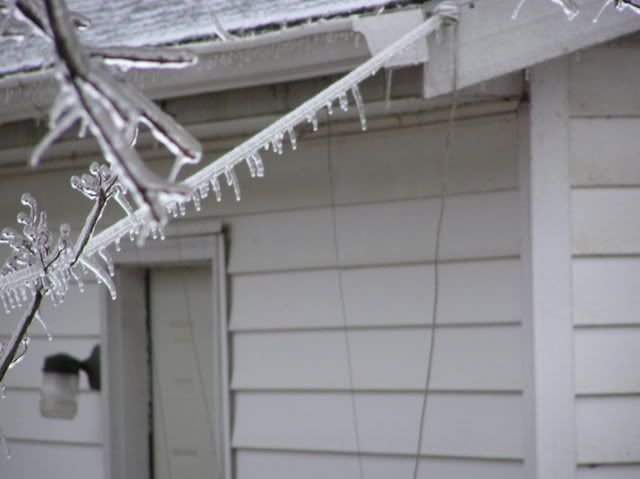
Telephone line to my shop
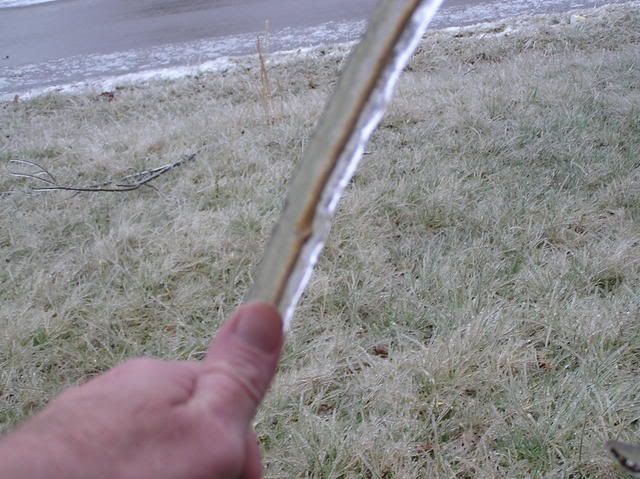
Vine on the front porch showing ice thickness
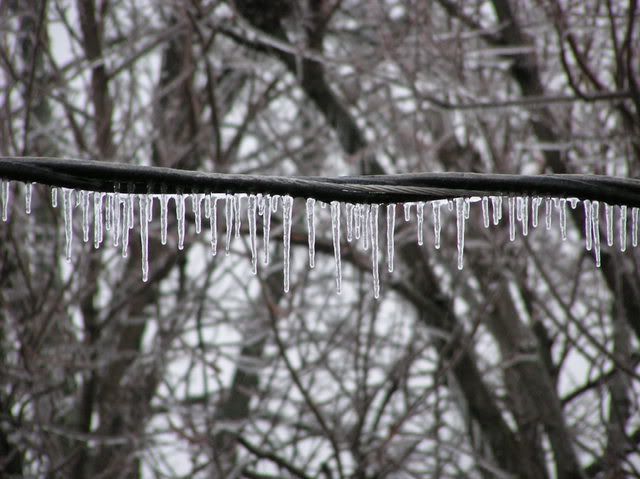
Incoming power line
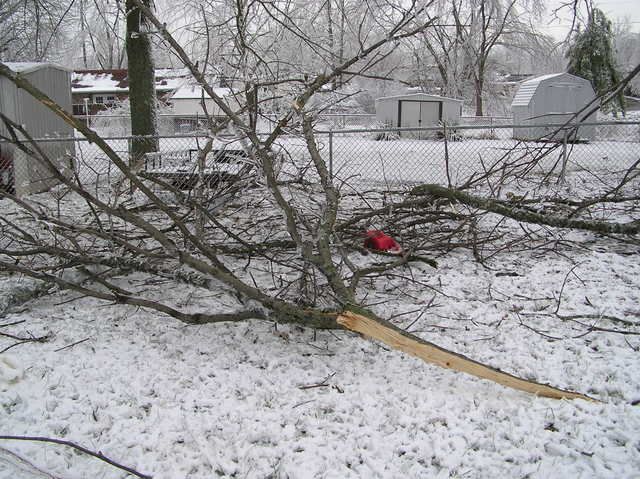
Tree damage
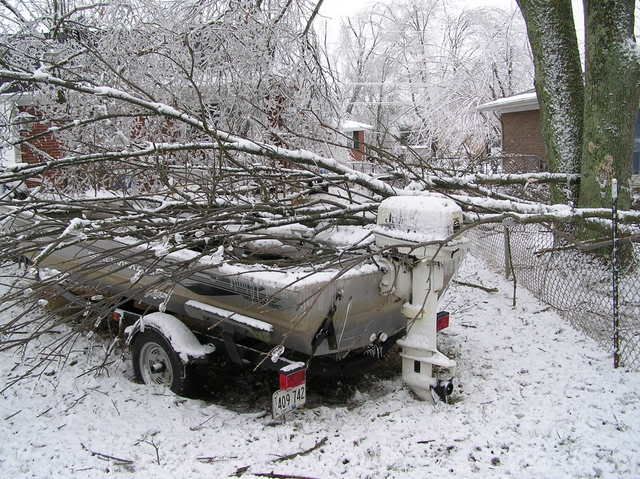
More tree damage
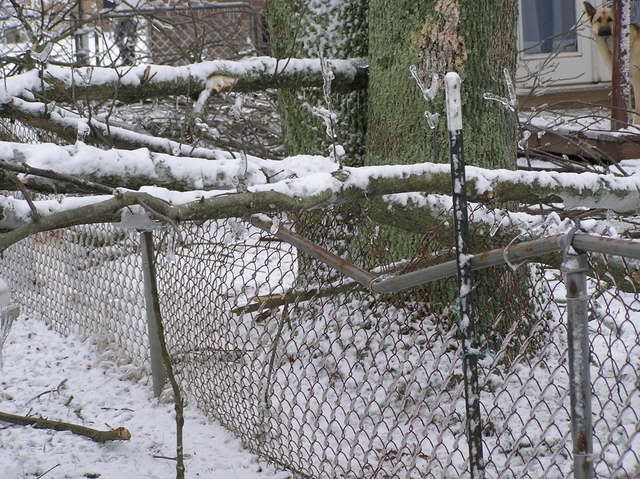
Even more tree damage
None of the tree damage were trees on my property, but rather on my neighbor to the right. He started working to clear the limbs in his yard before the ice had melted, and I ran out and plead with him to stop, as another limb could come down right on him. The thought about it, and waited until the ice had melted.
He is a very good neighbor, because he felt responsible for all of the limbs in my yard, and came and cut them up and hauled them off after the ice cleared. I would have helped, but I was in the back room with my battery powered radio running loudly enough that did not hear his saw. I do appreciate his efforts, and we remain friends to this day.
Well, that about does it. I realize that this is more contemporaneous than most pieces in this series, but I did not have any pictures from the ice storm from when I was little.
Please add any recollections that you have about growing up, whether or not in a little town. I know that the readers really enjoy stories other than mine, and so do I.
Warmest regards,
Doc, aka Dr. David W. Smith
Crossposted at
Daily Kos, and

1 comment
Author
remembering distant memories?
Warmest regards,
Doc